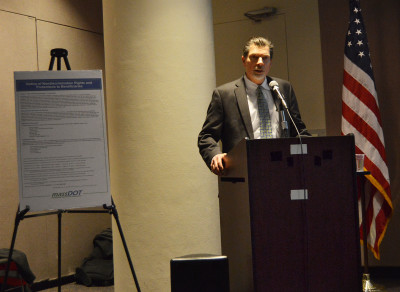
Following an announcement that the Massachusetts Bay Transportation Authority may discontinue late-night service, a public meeting was held Tuesday to discuss the decision with the public.
Approximately 30 members of the Boston community attended to share their thoughts with Charles Planck, assistant general manager of the MBTA. Planck began the meeting by introducing the reasons behind the talks of abandoning late-night service.
“The MBTA Fiscal and Management Control Board has recommended that late-night service be discontinued due to low ridership and high costs,” Planck said.
According to an MBTA presentation, the overall operating cost for late-night service is $14 million per year. Private contributions to support the service were time-limited and insufficient to offset operating costs.
Planck also discussed the decline in late-night service ridership.
“Ridership on late-night service has been low relative to all MBTA ridership,” Planck said. “Ridership was about 16,000 per night and it has declined to about 13,000.”
Planck added that the service also cuts into the amount of work time that technicians have available to do track work.
“With our normal service day ending at 12:30 or 1:30 [a.m.] and service starting up at 5:30 [a.m.], there’s a very small overnight window when you consider that it can take an hour or even more to set up tools and equipment to do rail work and then an hour or more to prepare for regular services,” Planck said.
Several attendees lined up to testify and voice their disagreement with the decision to discontinue service.
Emerson freshman Christopher Black spoke about the reliability and convenience of the late-night service.
“Classes can run until about 9:45 [p.m.], which means if Emerson wants to have school-wide meetings like the one I’m going to tonight that starts at 10 p.m., it can easily run for a few hours,” Black said. “Being able to get home safely and in a timely manner is important for me.”
Dan Harris, of Allston, reminded the MBTA to keep disabled riders in mind as they make this decision.
“I just want you to think about the implications that taking away that service would have for people who can’t use an Uber,” Harris said. “Trying to find a cab that’s accessible is defeat in itself. So just be aware that, for a lot of us, the T is the only option.”
Boston University student Olivia Dorencz said the MBTA should view this not only as an economic issue, but as a moral one as well.
“You said there are 13,000 people that are using the service,” Dorencz said. “That might sound like a small number, but that’s still 13,000 living, breathing people that are going to worry about how they’re getting home.”
Gabriel Distler, of Somerville, discussed the impact the shutdown would have on residents as well as local businesses.
“Has the MBTA studied if late-night has a positive impact on businesses such as bars, restaurants and theaters?” Distler asked. “Do you know what the negative impact will be on these businesses if it’s abruptly ended? If we close late-night service, we risk closing local services and we risk losing jobs.”
Distler also suggested several alternatives to cutting service, such as studying which late-night lines are most successful and cutting some of the underused bus lines.
In response to public concern for nightshift workers, Planck said that a lot of nightshift workers work from 11 p.m. to 7 a.m. and are already served by regular MBTA service hours.
According to Planck, the MBTA will conduct an equity analysis to examine the impact of the proposed change and help to see if there is a disproportional impact to minority and low-income riders. The MBTA will review these results before continuing the process.
After the meeting, several attendees shared their opinions on the decision.
Tori Loubert, a senior at Emerson College, said the service is most beneficial to college students.
“I don’t think [discontinuing the service] is a good idea considering that one-third of Boston’s population is college students,” Loubert said. “I think to better serve that community it should have a late night service.”
Marion Kinosian, a junior at Emerson College, also spoke about the safety of college students.
“We are a huge college town,” Kinosian said. “People are out on weekends at parties and you don’t want a bunch of drunk college students stuck anywhere. It just comes down to public safely.”
Reggie Clark, 62, of Brookline, pointed out the importance of looking at the situation from the MBTA’s perspective.
“These bus drivers and conductors have to do maintenance at night and take care of the buses so we can have them for the next morning,” Clark said. “I’m always considerate of a different point of view than everybody else. If [the service] is not working why have it?”
















































































































